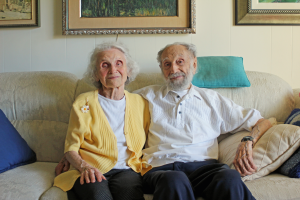By Jeremy Ogul
Mission Publishing Group, LLC

(Photo: Scoop San Diego)
LA MESA, California — Seventy-six years after they tied the knot, Phil and Sylvia Borkat – both 101 – are still holding hands like teenage lovebirds.
“When we walk, we do that, and people say, ‘Why are you holding hands?’” Sylvia says. “And he tells them, ‘Well, to keep from slugging each other!’”
The La Mesa couple remain mentally sharp and relatively healthy. They revel in cheeky banter and finishing each other’s sentences. Sitting on the couch in their humble Maple Avenue condo, they recount stories and speculate about how they made it so far.
They first met in their fourth grade classroom, where they sat in adjacent rows, but they didn’t go on their first date until the age of 16. The year was 1929. Philip drove a Nash to pick up Sylvia on their way to one of John Philip Sousa’s final concerts.
Phil did not want to marry until he could support a family, so they waited until the age of 25, when Phil was offered his first permanent job working for the government in Washington, DC.
“He picked up the phone and he said, ‘Sylvia, get everything ready. I’m coming to marry you,’” Sylvia says. “And I said, ‘Holy smackeronavich!’”
The couple relocated to Cleveland when Phil landed a job as chief engineer for the Viking Air Conditioning Corp., which manufactured parts for the military during the war effort. They had three children and stayed in Cleveland until 20 years ago, when they moved to La Mesa to be closer to one of their sons. Phil has now been retired for almost as many years as he worked.
But they remain active and until recently attended Shabbat services every Saturday at Tifereth Israel Synagogue in the San Carlos neighborhood of San Diego.
“We admire not only their intelligence and their ability to do so much at this age, but also they demonstrate for all of us how a loving and caring couple should act,” said Rabbi Leonard Rosenthal
So what are the secrets to reaching the age of 101?
“My analysis for our extended life is based on three things: good genes, good hygiene and good nutrition,” Phil says.
“One more thing: attitude,” Sylvia says. “You need to have an upbeat attitude.”
Genes certainly tell part of the story. Sylvia’s mother lived past her 98th birthday. Her father died at 81. Phil’s parents lived to 85 and 6=86.
Phil was a heavy smoker until 20 years ago. It never gave him any problems, he says, but he gave it up “just like that.” Sylvia says she’s a “nut” about nutrition, balancing each meal with a protein, a carbohydrate and vegetables or fruit. She gets help from Jewish Family Service’s Foodmobile, whose volunteers drop by three times a week to deliver meals.
“At our age, I have one thing to complain about,” Sylvia says. “I am so slow. I have slowed down in every way. That’s natural.”
“You ain’t no youngster anymore,” Phil interjects.
Born when William Howard Taft was president, the Borkats have seen an enormous amount of change in their lifetimes, from radio to television to streaming videos on Netflix. They’ve been around longer than frozen food and sliced bread. In fact, they were born just 10 years after the first flight at Kitty Hawk, N.C. and a little more than a year before the first commercial airline in the world was launched in Florida.
Asked about how people have changed, Sylvia notes two things.
First, divorce no longer carries the stigma it once did.
“People never would talk about divorce,” Sylvia says. “People used to think it was a disgrace to talk about it.”
Similarly, the social pressure to keep disease hidden has faded.
“Nowadays diseases are talked about,” Sylvia says. “They’re faced head on. Talking things out and learning from others is a good thing. We are mortal.”
Thinking about their own mortality, neither Phil nor Sylvia feel much fear or hesitation. They simply hope it won’t be painful for themselves or their family.
“I’m ready whenever it comes,” Phil says. “I have nothing to regret. I’ve had a good full life. I can’t complain. I had my partner with me the whole time. That’s good.”
*
Jeremy Ogul is a staff writer for the Scoop San Diego service, from which this article is reprinted with permission